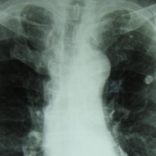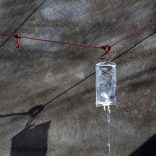Mozambique: Frelimo engages with striking teachers in Chimoio
Mozambique: The cost of the oxygen that keeps the flame of life burning – O País

Photo: O País
‘O País’ has published reports on thousands of patients who have survived hospitalisation and beaten Covid-19. To save lives, from January to date, the state has spent more than 80 million meticais on the purchase of medicinal oxygen. [around US$1,3 million at current exchange rates] Although treatment is free, a patient in a serious condition can cost up to 200,000 meticais on oxygen in just 15 days.
An abundant element that justifies our presence on earth – oxygen. Thanks to this element, we are able to breathe and carry out our daily tasks. And because it is so abundant and free, there are many who ignore Covid-19 preventive measures, forgetting that an exercise as simple as breathing can become so difficult.
When it invades the human body, the virus attacks the lungs, causing respiratory failure, so the patient needs alternative means of breathing to stay alive. However, these alternative means entail costs, one of which has to do with the purchase of medicinal oxygen.
Before the outbreak of Covid-19, Mozambique had only four large oxygen storage tanks, two at Maputo Central Hospital, one at Chimoio Provincial Hospital and another at Quelimane Central Hospital.
With the increase in hospitalisations due to Covid-19, two more were set up at the Polana Caniço Hospital and two at the Mavalane hospital, at a cost to the state of 22 million meticais. This amount is only related to the piping system in the two hospitals, given that the tanks themselves were donated by the oxygen supply company. In addition to installation, there are monthly expenses related to oxygen supply in hospitals.
“Before the disease, we spent approximately 12 million meticais per month [on oxygen], and now with Covid-19, we spend an average of 29 million meticais monthly. In the case of Polana Caniço, in the whole of 2020, we used about 47,000 cubic metres of oxygen, but in January alone, when there was a record of many cases of inpatients, we used 48,000 cubic metres, that is, more in one month than was consumed in a year,” National Director of the Central de Medicamentos António Hassane revealed.
According to the Ministry of Health, one Covid-19 patient in critical condition can use up to 200,000 meticais’-worth of oxygen in just 15 days.
An eight-cubic-metre oxygen cylinder costs the state 15,000 meticais. Before the pandemic, the country had just over 2,000 cylinders, but pressure imposed by Covid-19 has dictated the purchase of another 590 bottles.
“The cost of oxygen per cubic meter varies from region to region, taking into account transport costs. In the Maputo region, for example, a cubic metre costs 138 meticais and to fill an 8 cubic meter cylinder, 1,104 meticais is needed,” explained Hassane, adding that a patient in critical condition consumes 12 bottles of 8 cubic meters in just 24 hours, which means that, for each day of hospitalisation, the patient can cost more than 13,000 meticais just for oxygen.
MISAU advises against home use of oxygen
As it emerges that there are Covid-19 patients using oxygen at home, the Ministry of Health has advised against such procedures, which can be fatal. “We have information that many patients are buying oxygen cylinders to treat Covid-19. It should be noted that Covid-19 patients, in addition to oxygen, need another type of medication. In the management of the cylinders, the replacement of the equipment when the contents run out is complex. The person must have a key to dismantle the pressure gauges, and this process can determine a person’s life or death,” Abubacar Sumalgy, Head of Infrastructure at MISAU, warns.
Mazibuco: a hero uncovered by Covid-19
In addition to doctors, in the fight to save lives, there are heroes such as Raimundo Mazibuco. Before Covid-19, he was assigned to the Health Directorate of Maputo City, but, with the increase in hospitalisations, he was assigned to the Hospital da Polana Caniço as a maintenance technician. “I took on this mission with great pride, because I knew that it is at these moments when we show our value,” he says.
Responsible for controlling and ensuring the maintenance of the oxygen supply system in Polana Caniço, Mazibuco has experienced some intense moments. He narrated an episode in which he narrowly avoided tragedy. “It was on a day like today when I got a call saying that oxygen was not reaching patients. Since I live nearby, they sent an ambulance to pick me up. When I arrived, all the doctors were downstairs – the patients are hospitalised in a structure with more than one floor – and very concerned. I quickly equipped and climbed up and saw that, in fact, something was not right. I was analysing the installation and heard a gas escaping. Quickly, I got some rubber and closed the leak, and the oxygen started to arrive again in the wards and the doctors were happy,” he related. “Since that day, the doctors started to respect me more, and I felt more valued.”
In his daily rounds, Mazibuco sees the suffering experienced by Covid-19 patients, and leaves this warning. “Never listen to stories that Covid-19 does not exist, because I would not like you to witness what is going on inside the wards. This disease exists and it kills, and I pray every day that no one in my family gets it,” he concludes.
To guarantee oxygen supply for the hospitalized patients , the Ministry of Health intends to install 10 more tanks like those in the main provincial hospitals this year.
Since January, the state has already spent more than 80 million meticais on oxygen, which would be enough to build three Type II health centres, equipped with maternity wards, six beds and houses for employees.
By Raúl Massingue












Leave a Reply
Be the First to Comment!
You must be logged in to post a comment.
You must be logged in to post a comment.